History of Intramuros
Intramuros, the historic walled city within Manila, stands as a testament to the Philippines’ colonial past and resilience through centuries of trials, including colonization, wars, and natural disasters.
Exploring Intramuros felt like a journey through time for me. The Spanish-style buildings and ancient stone walls left a lasting impression. I particularly enjoyed the serene gardens of San Agustin Church. Discovering hidden spots and taking in views of the river made my day memorable. As night fell, the soft lights created a magical atmosphere. It wasn’t just a visit; it was a profound immersion into Philippine history and culture.
And let me tell you about nighttime—it was like the whole place transformed into a different world. The soft lights cast this magical glow on the old walls, and I could hear the sounds of people laughing and enjoying themselves in the nearby parks. Intramuros wasn’t just a place I visited; it was an experience that truly connected me with the rich history and lively culture of the Philippines.
Table of Contents
Spanish Colonial Era
Intramuros, known as the Ciudad Murada or Walled City, was established by the Spanish in the late 16th century. It served as the seat of government and political power during the Spanish Colonial Period in the Philippines.
The construction of the stone walls started in 1590 and was completed in 1872, taking almost 300 years due to various interruptions. The 0.67-square-kilometer city includes significant Spanish colonial architecture, such as Fort Santiago, Manila Cathedral, and San Agustin Church.
During Spanish rule,
this place was the hub for religion, military, and politics. Jose Rizal, a famous Filipino nationalist, was held in Fort Santiago before his execution in 1896. This event stirred up strong feelings against Spanish control.
In 1945, the Battle of Manila wrought devastating damage on Intramuros during World War II, leading to extensive destruction of life and property.
Post-war, the city went through significant reconstruction to restore its historical landmarks. Today, Intramuros is a prominent historical destination, reflecting the Spanish colonial history and architecture. Its survival and continuing restoration underscore its importance as a cultural and historical symbol for the Philippines.
Historical Landmarks and Architecture
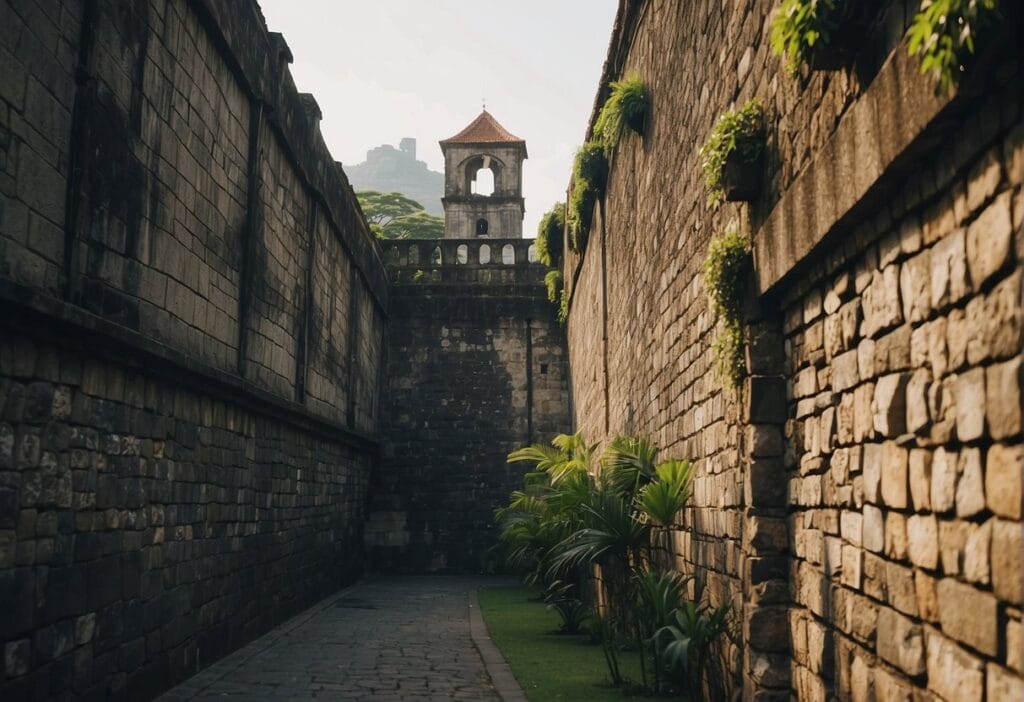
In the heart of Manila lies Intramuros, a testament to the Philippines’ colonial history, showcasing an array of Spanish-era baroque churches and formidable fortifications which continue to draw attention.
Philippine Baroque Churches
Intramuros is home to some of the most historically significant baroque churches in the Philippines, a style that incorporates dramatic detail and grandeur.
The Manila Cathedral, also known as the Minor Basilica and Metropolitan Cathedral of the Immaculate Conception, serves as the seat of the Archbishop of the Roman Catholic Archdiocese of Manila.
The cathedral has endured and risen from the ruins multiple times since its initial construction in 1581, reflecting resilience and architectural evolution.
Another baroque masterpiece is the San Agustin Church, recognized as a UNESCO World Heritage Site. This church, completed in 1607, is the oldest stone church in the Philippines with an ornate interior that houses the Museo de Intramuros, exhibiting ecclesiastical art and artifacts.
San Agustin Church stands as a prime example of the fusion of Spanish colonial architecture with local craftsmanship, which characterizes the Baroque Churches of the Philippines.
Fortifications and Gates
The defensive walls surrounding Intramuros, which gave it the name “Walled City,” were put up by the Spanish to protect against foreign invasions.
One of the most important places here is Fort Santiago. It’s like a fortress with a lot of history. It was used as a defense fort, a prison, and even a special place where something important happened with José Rizal, a hero in the Philippines.
With its storied ruins and rehabilitated areas, it offers insight into the architectural and military strategies of the period.
Encircling Intramuros are multiple gates, each having served as historical entry points. These gates include the notable Puerta Real and Puerta del Parian, showcasing enduring Spanish architecture.
They are intricate and robust, embodying the martial and aesthetic skills of the era. Visitors passing through these gates can experience a tangible connection to Manila’s rich past and the architectural prowess that has protected this district across centuries.
Cultural Heritage and Museums
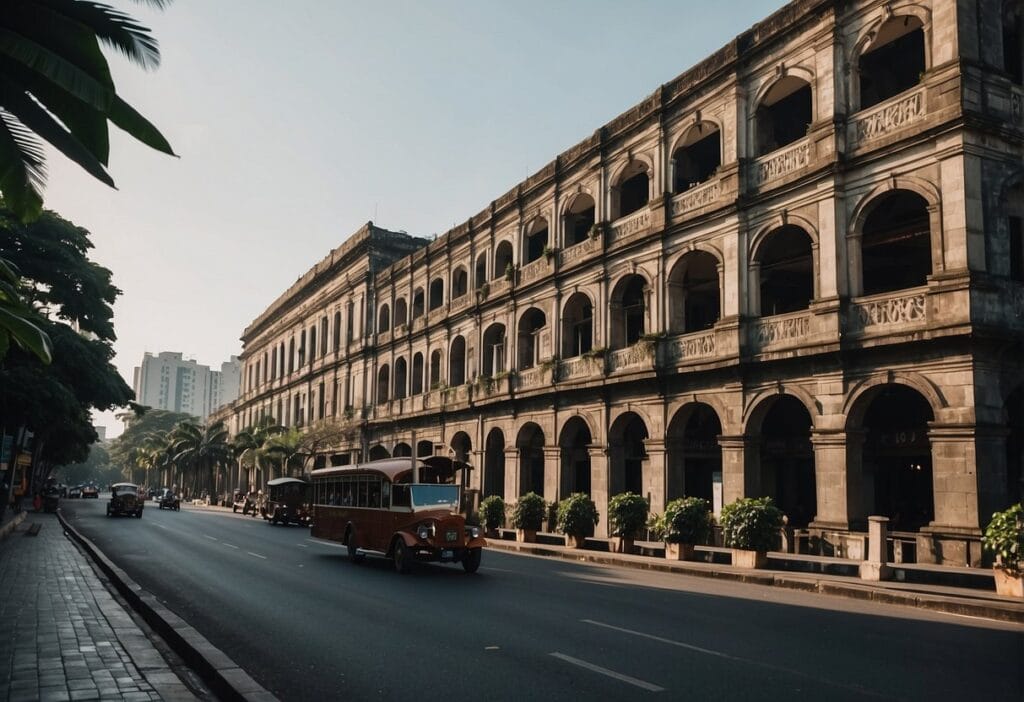
Intramuros, Manila is rich with history and cultural significance, captured within its numerous museums and historic sites that offer a glimpse into the Philippines’ colonial past and traditional Filipino culture.
Museums and Exhibits
The Rizal Shrine Museum is a deep respect to the Philippines’ national hero, Dr. Jose Rizal. This museum presents a two-storey treasure trove of relics and informational exhibits highlighting Rizal’s life and his contributions to the Philippine revolution against Spanish rule.
Casa Manila Museum replicates a colonial home, offering insights into the opulent lifestyle during Spanish colonization. The museum’s intricate architectural design and authentic period furnishings transport visitors back to the era of lavish living.
Bahay Tsinoy, another essential museum within the walls, documents the Chinese influence in Filipino culture. Here, one can find depictions of the lives of early Chinese settlers, including a representation of a traditional sari-sari store showcasing the interaction and blending of cultures.
Cultural Sites
The Baluarte de San Diego is a historic bastion in Intramuros. Its storied walls and gardens are not only a sight of historical military significance but also serve as a venue for cultural events and performances, encapsulating the traditional Filipino culture.
Add to this is Barbara’s Heritage Restaurant, which not only offers a taste of local cuisine but also provides a cultural experience with regular traditional Filipino performances, connecting food with the rich tapestry of Manila’s past.
Adjacent to the cultural fabric of the city is the Palacio del Gobernador, an imposing structure that bears witness to the political history of the Philippines and holds a vital place in the administration of Intramuros.
Modern Intramuros and Tourism
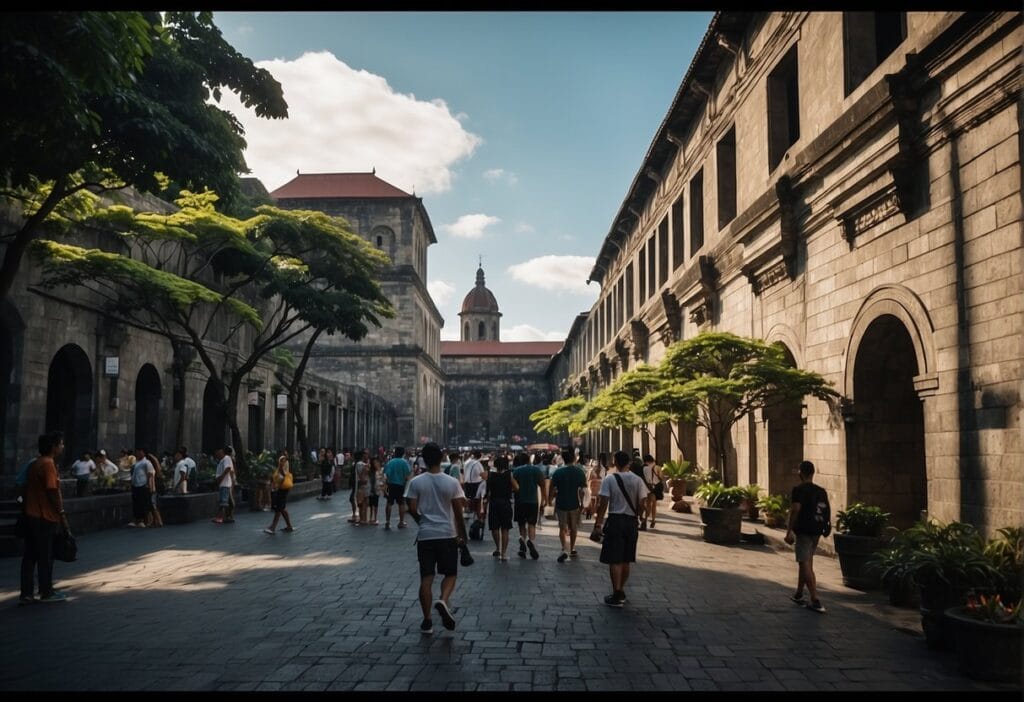
Intramuros, the historic Walled City of Manila, embraces its rich past while adjusting to the demands of contemporary tourism, offering visitors a blend of old-world charm and modern convenience.
Accessibility and Transportation
Intramuros is highly accessible to tourists, thanks to an array of transportation options.
Visitors can make use of the Grab service, a popular ride-hailing app in the Philippines, for convenient door-to-door travel.
For those keen on exploring the area at a leisurely pace, bike rentals are available, including the unique bamboo bikes, which offer an eco-friendly way to navigate the cobblestone streets.
Additionally, the district is well connected by public transportation, making it easy for visitors to arrive from various parts of Manila.
Tourism and Activities
The area buzzes with activities that pay homage to its historical significance while providing a vibrant experience.
Guided walking tours are a perfect way to soak in the history, giving tourists insights into how life was during the Spanish colonial era.
Tourist spots such as Fort Santiago, the Minor Basilica of the Black Nazarene (Quiapo Church), and San Agustin Church—a UNESCO World Heritage Site—remain as grandiose as they were centuries ago.
For a modern twist, one can visit the sky deck views for panoramic vistas, which blend the sights of Old Manila with the city’s contemporary skyline.
Engaging Manila tours cover major attractions while weaving stories of past and present, creating a rich narrative for every visitor.
Geography and Urban Development
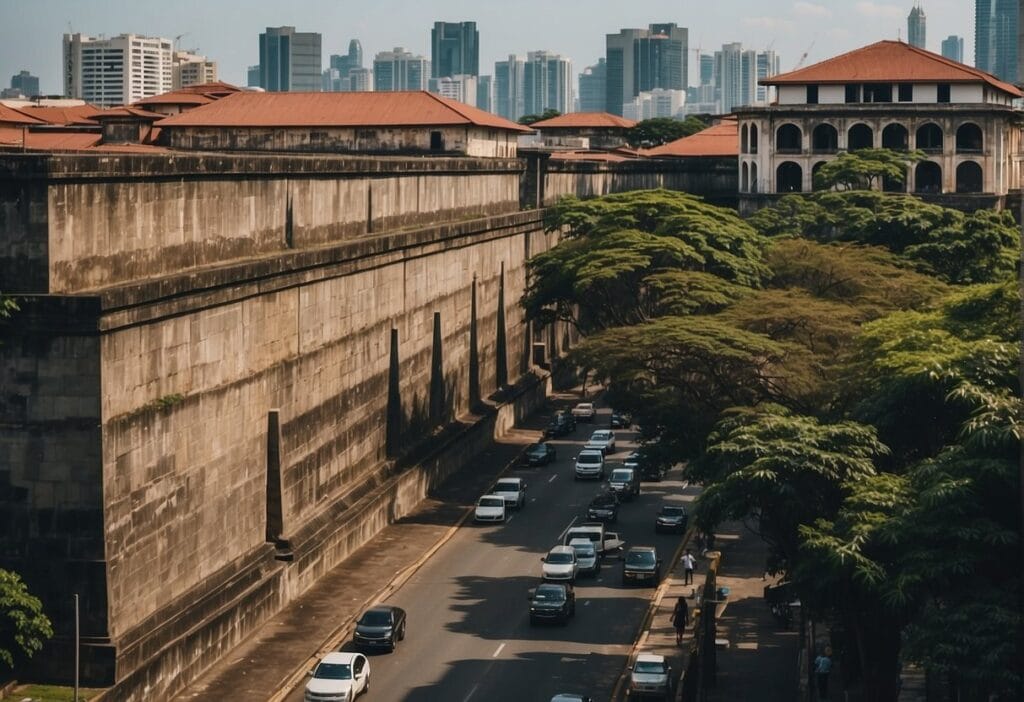
Intramuros, geographically positioned in the heart of Metro Manila, is steeped in history and is bounded by the Pasig River to the north. It’s located at coordinates 14.5896° N, 120.9747° E. The district is renowned for its historical Spanish-era fortifications and urban structure.
Urban Planning:
The Intramuros Administration, an agency established in the Philippines, oversees the development plans for this area. Their responsibilities include:
- Formulating policies, guidelines, and regulations for zoning, land use, and construction.
- Issuing building and construction permits.
- Inspecting and monitoring construction projects.
Development Strategy:
A sustainable renewal effort is crucial for preserving the historical and cultural significance of Intramuros. Rehabilitation includes:
- Addressing shelter concerns in informal settlements.
- Ensuring new constructions conform to the district’s historic aesthetic.
Landmarks and Infrastructure:
Several significant landmarks are within Intramuros, including:
- The Manila City Hall: A prime example of neoclassical architecture significant in municipal governance.
- The Ayuntamiento: Once a seat of the Spanish colonial government.
- Plaza de Roma: Historically known as Plaza Mayor, this public square is a focal point within Intramuros.
Education and Religion
In the heart of Manila, Intramuros has historically been a hub for educational and religious activities. As the seat of the Roman Catholic Archdiocese of Manila, it boasts a collection of Baroque churches that exemplify the influence of Catholicism in the Philippines.
This influence was primarily facilitated by Spanish Catholic missionaries. Notably, Manila Cathedral, established by the missionaries, stands as a testament to the Catholic heritage of the city.
Educational institutions have flourished within the walls of Intramuros since the Spanish era. One of the oldest, Colegio de San Juan de Letran, was founded in 1620 and continues to be an important landmark for Filipino education.
Moreover, the University of the City of Manila, also known as Pamantasan ng Lungsod ng Maynila, and Manila High School are significant institutions, contributing to the region’s literary and scientific progress.
- Churches reflecting the religious devotion include:
- Manila Cathedral
- San Agustin Church
Intramuros was also where the national hero, Dr. Jose Rizal, was detained before his execution, which took place nearby in what is now known as Rizal Park.
His life and accomplishments made a lasting impact on Philippine schooling and patriotic feelings.
The coexistence of religious structures and institutions of learning in Intramuros importantly mirrors the intertwined nature of faith and knowledge in Philippine society, a legacy of its colonial past.
Frequently Asked Questions
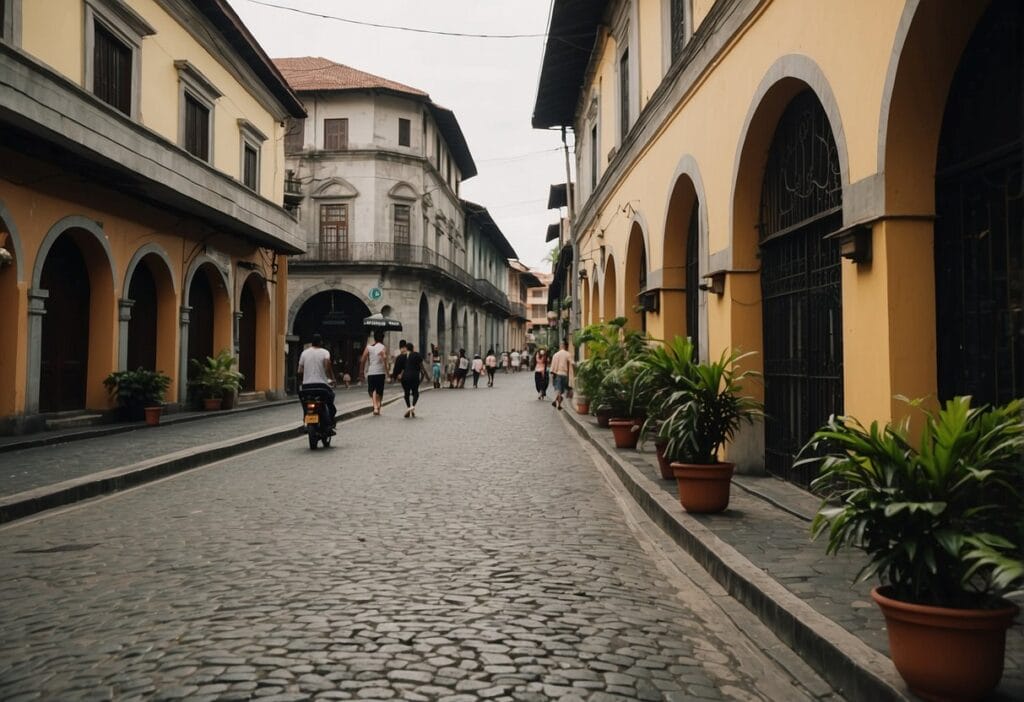
In this section, visitors like me have found the answers to common queries about Intramuros, the historic walled area of Manila, which is rich in heritage and filled with tourist attractions.
What are the top tourist attractions to visit in Intramuros?
The must-visit attractions in Intramuros include Fort Santiago, Manila Cathedral, Plaza de Roma, Casa Manila, San Agustin Church, Baluarte de San Diego, and Bahay Tsinoy.
These landmarks offer a glimpse into the area’s vibrant history and colonial architecture.
How can one explore the historical significance of Intramuros during a visit?
Visitors can learn about Intramuros’ rich history through various walking or bike tours. These guided tours provide comprehensive details about the area’s past, the Spanish colonial era, and the significant events that took place within the walled city.
Are there any guided tour packages available for visiting Intramuros?
Yes, there are multiple guided tour packages available, including walking, bike, and even kalesa (horse-drawn carriage) tours.
These packages usually cover the main attractions and often provide in-depth historical information.
What are the accommodation options available near Intramuros for travelers?
Travelers can find a range of accommodation options near Intramuros. From budget-friendly hostels to luxury hotels, there are lodgings to suit various preferences and budgets, many of which are within walking distance to the walled city.
Can visitors access a map of Intramuros to navigate the area?
Maps of Intramuros are readily available for visitors. They can be found at the tourist information centers, and many tour providers also offer maps to help tourists navigate the historic sites and streets of the walled city.
Is there a difference between Intramuros and Fort Santiago?
Yes, there is a difference.
Intramuros is the walled city itself, encompassing 64 hectares and including several distinct sites and landmarks.
Fort Santiago is a citadel located within Intramuros and is one of its prominent and historically significant features.
